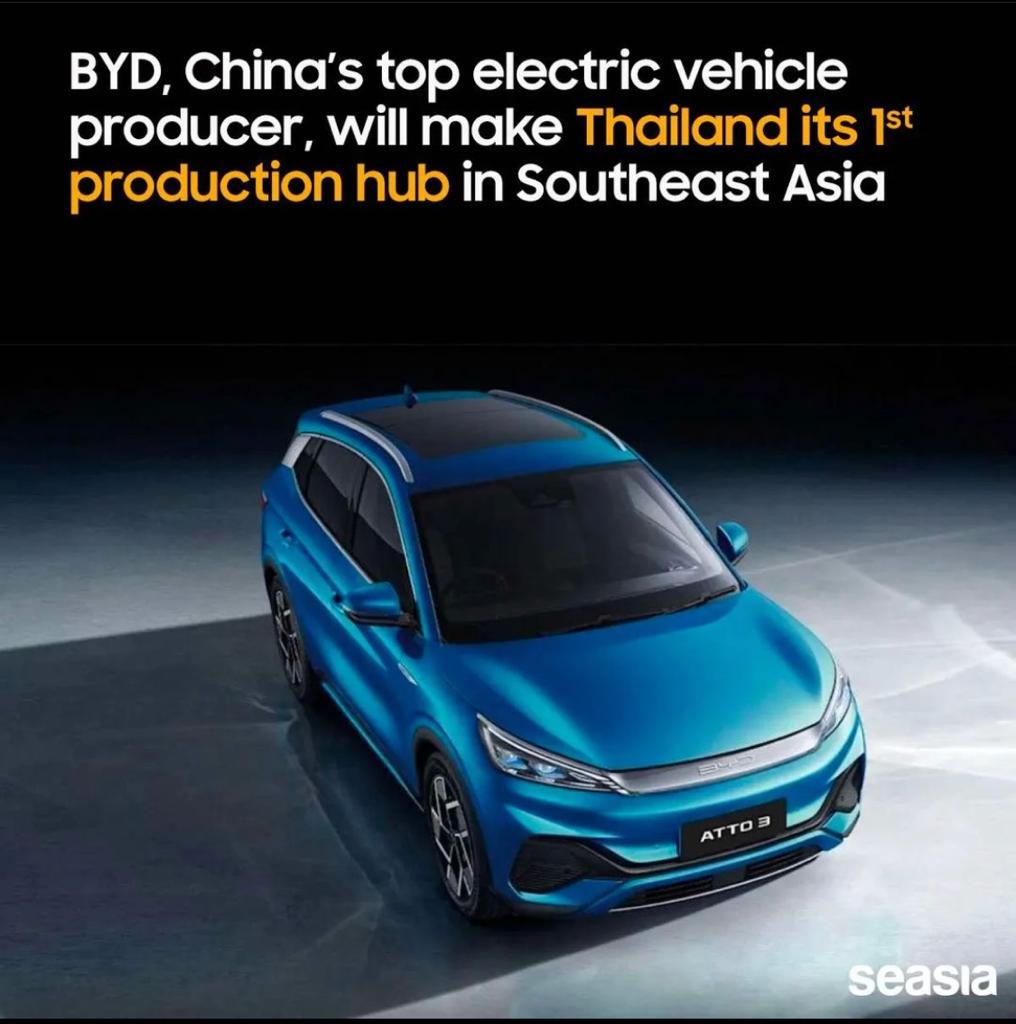China's top electric vehicle manufacturer, BYD, will establish Thailand as its first production hub in Southeast Asia. This will likely compete with other Chinese brands already present in the country and position it to benefit from an anticipated, government-supported increase in demand.
According to Liu Xueliang, manager of BYD's Asia-Pacific division, the company plans to erect a right-hand drive electric vehicle manufacturing facility in Thailand. According to him, the plant will have a 150,000 unit annual capacity. Automobiles produced at the site will be shipped to Europe and ASEAN nations, according to Liu.
Liu was speaking during a signing ceremony to mark the deal between BYD and the land seller.

The developer of a Rayong province industrial estate, which is around 140 kilometers southeast of Bangkok, WHA Group, reported that it has sold 600 rai (96 hectares) of land on the property. That amounts to just under 500 of the estate's 1,281 rai.
500 of the remaining rai have been saved for additional Chinese EV supply chain businesses and EV part makers who are about to invest in Thailand, according to Jareeporn Jarukornsckul, co-founder and chairman of WHA.
These investments, according to Jareeporn, will be a "second phase" of the development.
The WHA is in discussions with one more of China's top five EV manufacturers, she noted.
“Since Thailand is now equipped with EV infrastructure—a supply chain, the government’s supporting policies, and strong demand—we are now ready to be the EV production hub of ASEAN and of the world,” Jareeporn said.
The Board of Investment of Thailand approved a BYD investment privilege last month. A top BOI official stated earlier last week that the EV manufacturer must "start investing within three years."
Thanks to government incentives that would significantly reduce sticker prices, it is anticipated that Thailand's EV sales will increase quickly. The goal is to draw enough customers to establish a scale economy and encourage investment in the industry.
The amount of the subsidy for each EV may reach THB 150,000 (USD 4,130).
In a different measure, the government reduced import taxes on electric vehicles on June 9 from 8% to 2% in exchange for manufacturer commitments to eventually shift EV production to Thailand.
By 2030, the percentage of EV sales in Thailand is expected to reach 30%, making Thailand the ASEAN region's center for EV manufacture.
BYD, which was established in February 1995 as a manufacturer of rechargeable batteries, is now present in more than 30 industrial parks worldwide. It has a large presence in the fields of rail transportation, new energy, autos, and electronics.
For the first half of 2022, BYD reported a net profit of RMB 3.5 billion (USD 504.4 million), more than tripling its result from the prior year. The company has set its sights on entering more than 15 other countries after outselling Tesla and other competitors in domestic sales.
By the end of the year, it hopes to begin selling Dolphin models in the country thanks to a partnership with Rever Automotive (Thailand), an importer of electric cars from China. There will be more EV models.
The ASEAN-China free trade agreement, which has been in force since 2005 and permits Chinese producers to send EVs to Thailand duty-free, will benefit BYD. As a result, Dolphin model prices will be on par with those of comparable Chinese EVs.
The EV market in Thailand is already dominated by two significant Chinese companies. With 5,219 EVs sold in the first half of 2022, Great Wall Motor (Thailand), which entered the market in 2020, is currently in first place. MG brand owner SAIC Motor, located in Shanghai, sold 4,500 EVs in Thailand within the same time frame.
The Eastern Economic Corridor, a sizable industrial development zone that is a component of the government's Thailand 4.0 plan to elevate the nation to high-income status by 2036, is where Rayong Province is located.
Source: Nikkei Asia


















